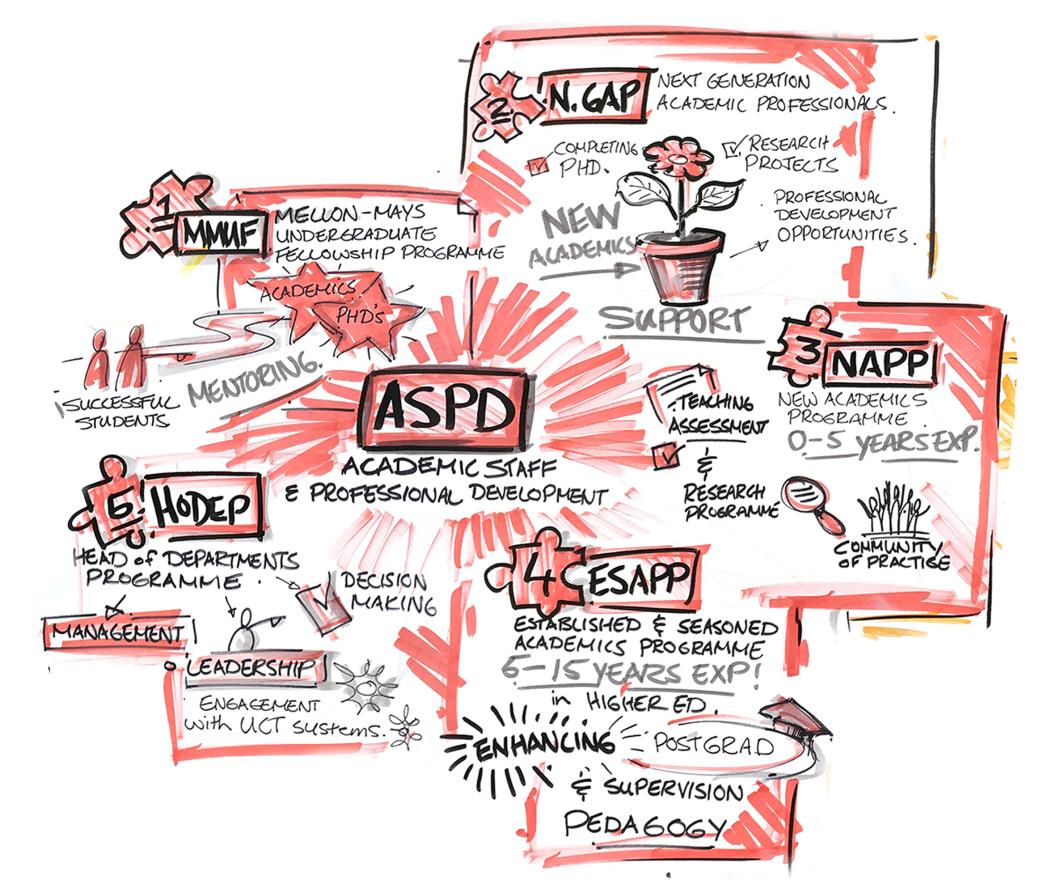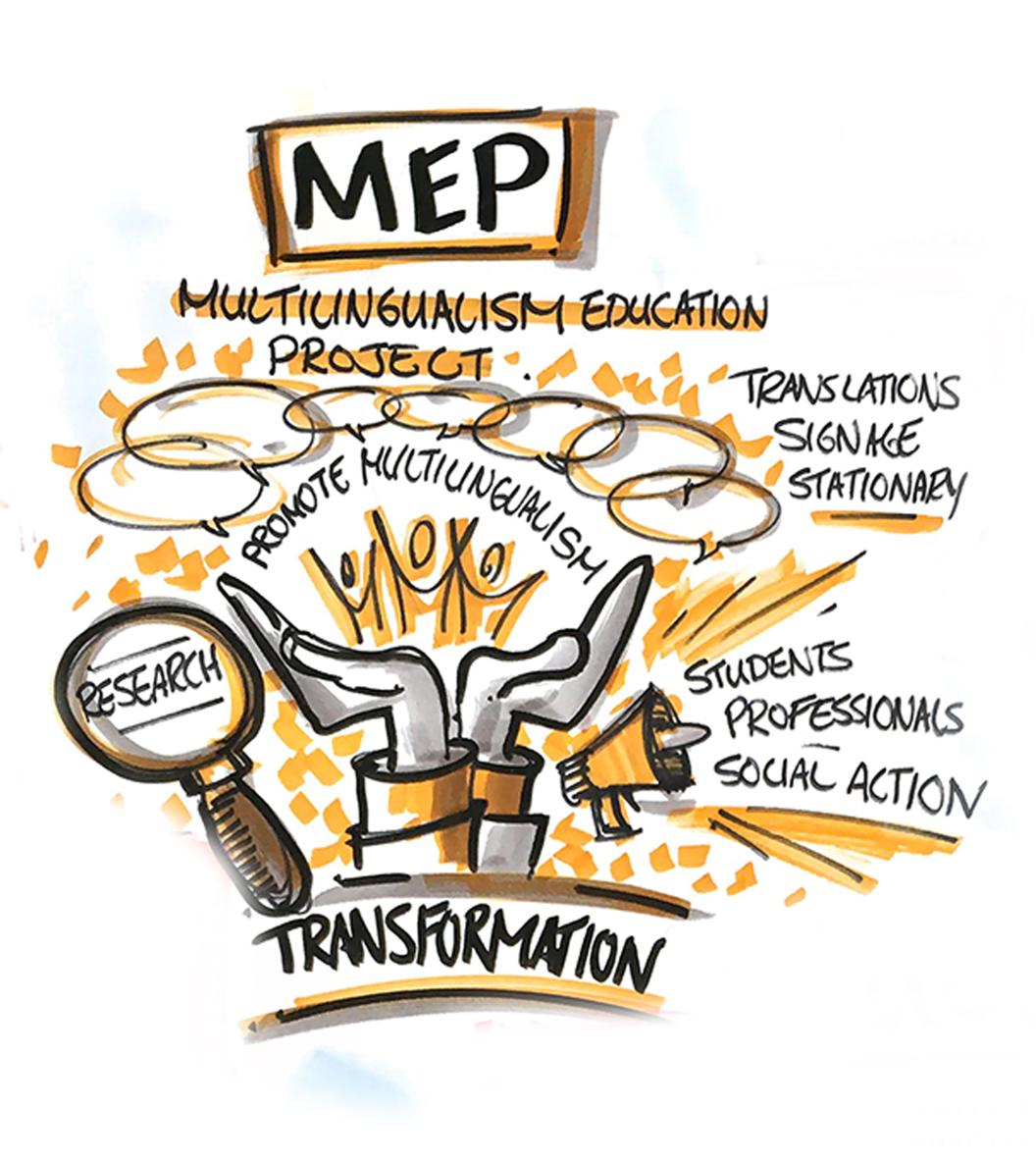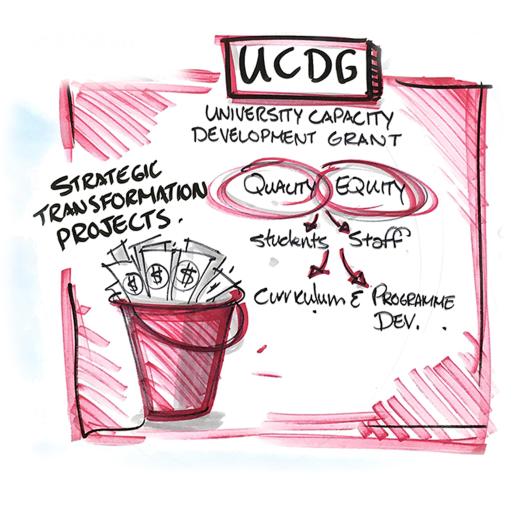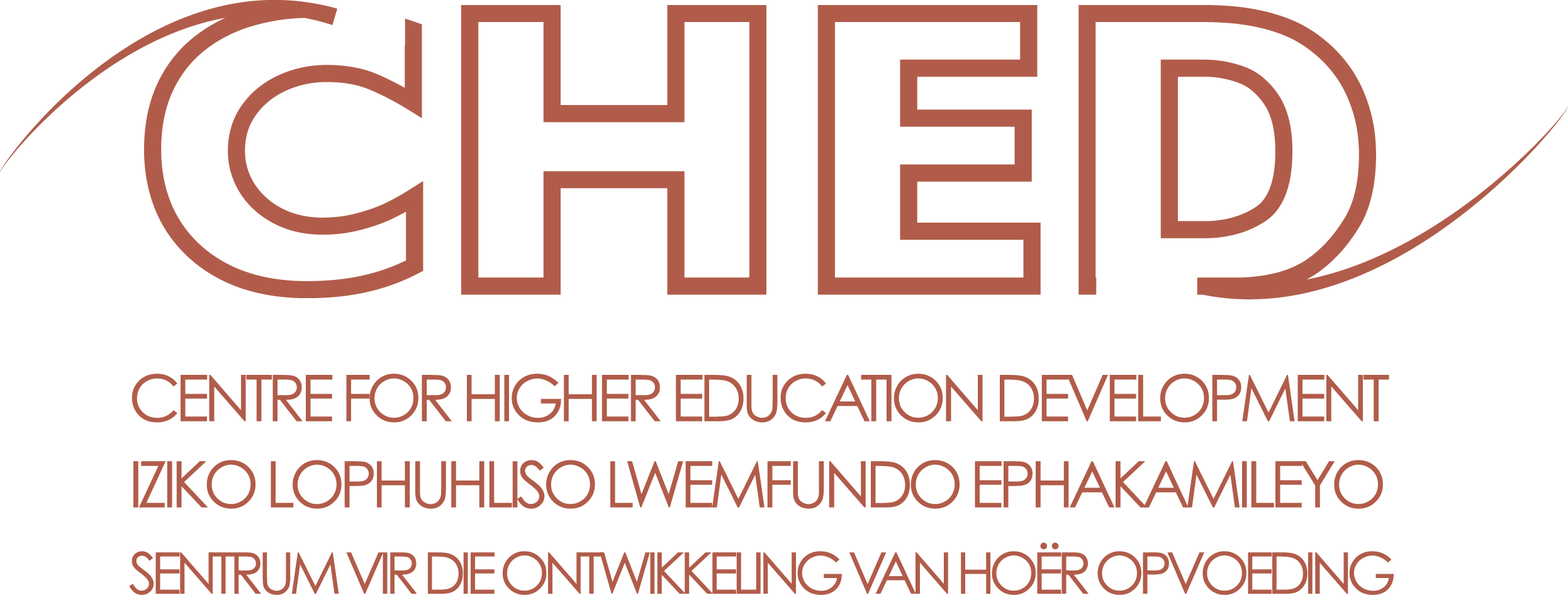Apart from the work of the five CHED departments, several special projects are supported through the Dean’s Office as strategic projects. As such the Dean’s Office is considered as a sixth department.
What these projects have in common is that they all offer opportunities for development to staff and students on the path to join academia, or to enhance their roles in the university. The DO houses key strategic projects and programmes which have an institutional or national focus and function. In essence, these projects, although externally facing, form an integral part of CHED’s offering to UCT and beyond.
These include:
- Academic Staff and Professional Development Unit
- Multilingualism Education Project
- University Capacity Development Programme Office

Academic Staff Professional Development Unit
Who we are
The Academic Staff and Professional Development (ASPD) Unit endeavors to support academics by developing and enhancing their ability in their roles as university teachers, researchers, and members of the UCT academic community, at various stages of their academic career, so that they may exercise their agency in meaningful ways.
Based on a cohort model and organised in terms of target or beneficiary audiences, the ASPD is made up of a number of programmes, in keeping with DHET’s framework (NFfEAUT, 2018) for staff capacity development and enhancement. These include the nGAP, Mellon Mays Undergraduate Fellowship (MMUF) which is part of the New Emerging Scholars Programme (NESP), the; NAPP, ESAPP, HoDEP and TSCOT
What we do
Cohort Professional Development Programmes
ASPD offers a suite of contextualised and critical professional development programmes to prepare academics to make informed choices about research, teaching, learning, assessment, and curriculum practices.
-
The New Academics’ Practitioners’ Programme (NAPP), our flagship programme for new academics, provides a strong model of contextualised induction for new academics transitioning into higher education.
-
The Established and Seasoned Academic Practitioners’ Programme (ESAPP) is targeted at enhancing the teaching practices of established or seasoned academics, with a focus on post-graduate teaching and supervision pedagogy.
-
The Heads of Department/ Division Enhancement Programme (HoDEP) support and provides capacity-building opportunities for middle-level leadership and management.
-
The Scholarship of Teaching and Learning for Change (SoTL4Change@UCT) Programme is designed to elevate and change academic teaching practices across various disciplines through systematic and relevant inquiry into higher education teaching and learning.
Key Contacts: Cohort Professional Development Programmes
Director: Associate Professor Kasturi Behari-Leak (kasturi.behari-leak@uct.ac.za)
Administrative Officer: Avrill Dawson (avrill.dawson@uct.ac.za)
New Generation of Academics' Programme (nGAP)
The New Generation of Academics Programme (nGAP), is an opportunity provided by the Department of Higher Education (DHET) to build a new generation of black South African academics. The DHET’s 2015 vision document, “Staffing South Africa’s Universities Framework: A comprehensive, transformative approach to developing future generations of academics and building staff capacity”
The programme “involves the recruitment of highly capable scholars as new academics, against carefully designed and balanced equity considerations and in light of the disciplinary areas of greatest need”. The nGAP scholars are appointed into permanent positions where from the outset their conditions are customised to ensure their successful induction into the ranks of established academics.
The DHET provides funding over a six-year period to support the appointment of an nGAP lecturer, and their time is protected to provide the best possible opportunity for the completion of a doctorate degree in the shortest possible time. Once the degree is completed, the nGAP lecturer’s teaching commitments are steadily increased until they shoulder a full teaching load
Key Contacts: nGAP Programme
Coordinator: Associate Professor Mary Mashela (mary.masehela@uct.ac.za)
Administrator: Claudia Petersen (claudia.petersen@uct.ac.za)
Mellon Pipeline Development Programme
Funded by the Andrew W Mellon Foundation the primary objective of the MMUF is to address the issue of underrepresentation in the academy. The two-year programme identifies five outstanding undergraduate, third year students (annually) in Mellon-designated humanities, arts and social science fields who intend to pursue a PhD and a career in academia.
Through the provision of financial support, mentoring and stimulating academic activities, the programme aims to establish fellows on an academic career track which will lead to their becoming scholars in their field. Started at UCT in 2002, UCT MMUF has produced 28 PhDs, with five fellows currently registered in PhD programs in South Africa and abroad. As of 2023, due to a shift in the Foundation’s strategic direction, South African MMUF universities would no longer choose new cohorts. Support for the 2022/2023 cohort remained ongoing until honours graduation at the end of 2023 when budget grants came to an end. Graduate fellows in the system continue to be supported informally.
The Mellon Pipeline Development Programme (MPD) launched in 2024, provides holistic postgraduate support from Masters to PhD to develop the next generation of previously disadvantaged South African scholars in the Arts, Humanities and Social Sciences. Through targeted, scaffolded workshops and peer community-building retreats internally as a UCT cohort and also externally as a cross-institutional cohort (alongside UWC and Wits MPD’s), the programme seeks to build scholarship and research skills development towards progressing in the Masters and the PhD thereafter and ultimately enter into employment in the academy.
Key Contacts: Mellon Pipeline Development Programme
Coordinator: Kathy Erasmus (kathy.erasmus@uct.ac.za)
The Multilingualism Education Project (MEP)
Who we are
The Multilingualism Education Project (MEP) was launched in 2005 following the approval of the University’s Language Policy and Plan by Senate and Council. The University Language Policy takes as its starting point the need to prepare students to participate fully in a multilingual society, where multilingual proficiency and awareness are essential. The Project is hosted by the Centre for Higher Education Development (CHED) and is managed by a Senate Language Policy Committee chaired by a Deputy Vice Chancellor or nominee.
What we do
MEP works to ensure the consolidation of existing multilingual and language development projects and the development of appropriate multilingual materials in the curriculum in order to support students for whom English is a second language. In addition, we work towards the development of communicative, workplace-orientated courses in Afrikaans and isiXhosa for staff and students and promoting the intellectualisation of Xhosa and other relevant indigenous African languages for use in different academic disciplines.

Our service offerings include:
-
IsiXhosa Communication Skills courses for staff and students
-
IsiXhosa and Afrikaans for Law (to be extended to Commerce, Science, Social Work and Engineering Faculties)
-
Multilingual Signage
-
Multilingual Concept Literacy Glossaries
Key Contacts: MEP
Director: Associate Professor Lolie Makhubu-Badenhorst (lolie.makhubu-badenhorst@uct.ac.za)
Academic Coordinator: Zukiswa Zono (zukiswa.zono@uct.ac.za)
The University Capacity Development Grant (UCDG)
Who we are
The University Capacity Development Grant (UCDG) is a key component of the University Capacity Development Plan, designed to strengthen and expand the capacity of higher education institutions.
By providing targeted funding, the UCDG supports the development of critical infrastructure, academic resources, and innovative initiatives that enhance teaching, learning, and research. This grant empowers universities to build a more robust and sustainable educational ecosystem, foster academic excellence, and improve student outcomes. Through strategic investments, the UCDG helps institutions meet the evolving demands of higher education, ensuring they remain at the forefront of academic and professional advancement.

What we do
We serve as the primary point of contact between the Department of Higher Education and Training (DHET) and the University. We provide institutional oversight for programmes within the University Capacity Development Programme (UCDP) and ensure the successful implementation of projects funded through the University Capacity Development Grant (UCDG). We also perform a monitoring and evaluation function within these programmes for impact.
Key contacts: UDCG Office
Programme Manager: Lisa Cloete (lisa.cloete@uct.ac.za)
Programme Administrator Paula Harker (paula.harker@uct.ac.za)
